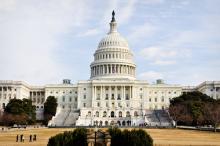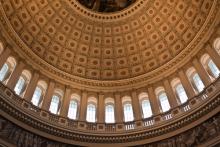FOR IMMEDIATE RELEASE &nbs
Budget

A coalition of diverse Christian leaders working together to help hungry and poor people in the U.S. praised congressional negotiators for including key anti-poverty provisions in this week's spending and tax agreements.
The Circle of Protection had called on Congress to make previous improvements to the Earned Income Tax Credit and Child Tax Credit permanent. They declared the passage of a bill making that happen a "major victory" for low-income working families.

FOR IMMEDIATE RELEASE &

The vituperative attacks on the War on Poverty sound a little gleeful or mean-spirited or nutty—sometimes all three. A quick review of recent press coverage would lead almost anyone to think that Head Start, Legal Services, community health centers, food stamps, ESEA Title I support for education, the Job Corps, and a host of other programs had no connection to the War on Poverty but materialized sui generis to provide vital services to the poor.






We’ve created a Christmas monster: a grotesque assemblage of pagan, Christian and capitalist symbolism into something that resembles something we’re both attracted to and repulsed by at the same time. We’re fueled by an admixture of both guilt and greed, while the domestic economy pins its annual hopes on our propensity for spending far more than we have or want to spend.
All in the name of baby Jesus.
It seems that we have no means of escaping the vortex of materialism, partly because whoever is the first not to buy gifts is the cheap jerk who throws the whole transactional nature of gift-giving out of whack. But one Christmas, a few years back, my wife, Amy, and I had finally reached our limit. We were in the midst of our Financial Peace budget slim-down and Christmas spending was an obvious target.

In the short three months that I have been at Sojourners as the director of individual giving, I’ve been humbled and inspired by the countless social justice activists who make up our community. In these three months, I have witnessed activism for immigration reform, a vigil for those most affected by congressional dysfunction, organizing for climate change, a prophetic stand for racial justice, the launching of a new campaign to empower women and girls, and much more.

Gov. John R. Kasich (R-Ohio) did a shocking thing recently. He broke with his political allies and decided to expand Medicaid to 275,000 poor people in his state through the Affordable Care Act. Then he called a spade a spade, saying: “I’m concerned about the fact there seems to be a war on the poor.”
Kasich’s statement came just two days ago. And today, 47 million low-income Americans will see their food stamps benefits decrease as stimulus funding ends. In light of this newly named “war on the poor,” I’ve been reflecting on Jesus’ story of the Good Samaritan, and the man’s question to Jesus, “Who is my neighbor?” What an intriguing question.
Of course one of the most incredible things about this story is that Jesus never answers the lawyer’s question. Rather, he tells a story about a man beaten by robbers on a dangerous road. He was stripped naked left lying there, clinging to life. Both a priest and Levite pass him by, but a Samaritan went out of his way, broke his usual routine, used up his own gas (or at least his donkey’s energy) to bring the man to an inn. And he took care of him overnight at the inn, offering the innkeeper what would today be about $330.
And then Jesus flips the script! The lawyer asked who exactly is my neighbor? Who do I have to love? And conversely who can I cross off my need-to-love list?
Jesus doesn’t answer the question. Jesus returns his question with a question: “Who was a neighbor to the man who fell into the hands of robbers?”
Nowadays we hardly have a concept of what it means to be a neighbor anymore.

WITH THE HEAT of mid-year finally over—judging by the fact that Dallas has settled into a sweater-friendly 97 degrees—it’s time to look back and see what we’ve learned from another summer filled with unpredictable weather extremes.
For example, a couple weeks in August were actually extremely comfortable, which was no help to my crusade to convince Fox-loving friends that the earth is warming. Lately, even scientists have been of little use, adamantly refusing to blame rampant forest fires and extreme droughts on climate change. They insist on “analyzing” patterns of weather “over time” to honor “standards of science.” There’s nothing worse than climatologists dragging their feet when there are righteous accusations to be flung. Global warming is behind EVERYTHING wrong! You know it. I know it.
Okay, sorry.
But this summer had way too many examples of the extreme consequences of climate change, including deadly tornadoes, inundating floods, and town hall meetings that brought forth a storm of discontent. Unsuspecting members of Congress had left the comforting gridlock of Washington, D.C., and, failing to first check for a full moon, had innocently invited questions from constituents in their home districts. This is almost always a mistake. You really need to test the water before you just walk into a home district unprepared.

Sister Simone Campbell, the face of the famous “Nuns on the Bus” tours, and Rep. Paul Ryan, the brains behind the House Republicans’ budget-cutting plans, have for more than a year represented diametrically opposed camps on how to apply Catholic social teaching to American fiscal policy.
At a House Budget Committee hearing on Wednesday, the two Catholics had a chance to square off as the sister testified before Ryan’s committee about hardship in America as the nation nears the 50th anniversary of President Johnson’s 1964 declaration of the “War on Poverty.”
Yet there were few fireworks nor much in the way of theological debate, as Ryan, R-Wis., did not go out of his way to champion the GOP budget plan that bears his name. That plan focuses on cutting social programs that Campbell says are key to supporting struggling Americans and also boosting the economy.

YEAR AFTER YEAR, more than 50 percent of the federal discretionary budget goes to the Pentagon, while only one-third of the non-defense discretionary budget is invested in struggling states and communities—a contrast at the heart of this year’s congressional budget battles. And yet for decades the Pentagon budget has remained sacrosanct while local communities suffer.
From the ground up, activists around the country are fighting back. They are striving to save their communities by calling for cuts in what they perceive as a bloated Pentagon budget—starting in some of the most unlikely places: local city councils.
My organization—the Minnesota Arms Spending Alternatives Project (MN ASAP)—is just one of many groups around the country seeking to shift federal spending priorities from preparing for and waging war to meeting local needs. Through a simple resolution, we build political support by asking churches, organizations, city councils, and state legislators to endorse our initiative to cut Pentagon spending and invest in communities.
In 2011, the Minnesota state government shut down over disputes as to how to address a two-year, $5 billion budget shortfall. Yet Minnesota taxpayers spent nearly $3.5 billion to fund the wars in Iraq and Afghanistan in 2011 alone, bringing total Minnesota taxpayer spending for these wars to $40 billion, according to the National Priorities Project. As in other states, many cities and communities in Minnesota are managing austerity budgets, tightening their belts and laying off police, firefighters, and teachers—all while the Pentagon budget remains unchecked.

The common good is not only about politics. The common good is about life and how we live it. It is ultimately about how we are all connected. It is about how our love or lack of love affects our families, our neighbors, our communities, our cities, our nation, and our world.
The common good is about personal brokenness. Have we taken the time to let Jesus come in and heal the wounds that distort the image of God within of us — wounds that drive daughters and sons, mothers and fathers to self-destruction? Have we taken the time to let the Great Physician heal the personal wounds that break families and friendships, slicing the central fabric of society? We are all connected.

While immigration and gun violence issues are capturing most of the week's headlines, the budget battles have re-emerged in Washington, D.C. Last month House Budget Chairman Paul Ryan (R-Wis.) and Senate Budget Chairwoman Patty Murray (D-Wash.) released competing budget proposals. And today, President Barack Obama released his own plan, which aims to reduce the deficit through a combination of spending cuts and revenue increases.
As The Washington Post's Ezra Klein and Evan Soltas note:
Today’s budget is the White House’s effort to reach the bedrock of the fiscal debate. Half of its purpose is showing what they’re willing to do. They want a budget compromise, and this budget proves it. There are now liberals protesting on the White House lawn. But the other half is revealing what the GOP is — or, more to the point, isn’t — willing to do. Republicans don’t want a budget compromise, and this budget is likely to prove that, too.
As the White House sees it, there are two possible outcomes to this budget. One is that it actually leads to a grand bargain, either now or in a couple of months. Another is that it proves to the press and the public that Republican intransigence is what’s standing in the way of a grand bargain.
The effects of the federal funding sequester are beginning to hit, and it’s not a pretty picture. Amanda Terkel and Sam Stein at Huffington Post write that while the damage is being downplayed, it is very real and painful.
“Organizations and companies have begun laying off workers, while many more have decided not to staff vacant positions. Schools on military bases are contemplating four-day weekly schedules. Food pantries have closed, as have centers that provide health services. Farmers have been forced to go without milk production information, causing alarm in the dairy industry and the potential of higher milk prices. Workers at missile-testing fields are facing job losses. Federal courts have closed on Fridays. Public Broadcasting transmitters have been shut down.”
They go on to list 100 specific stories from the past week of cuts that are taking place across the country. It’s a broad swath effecting many thousands of people. And the longer it goes on, the worse it will become.

This week a large number of Americans are celebrating Holy Week, leading up to Easter Sunday. Churches will be packed with both the regulars as well as the once- or twice-a-year worshippers for the "Super Bowl of Sundays" to celebrate Christ’s victory over death and sin and his glorious resurrection.
In the midst of an exasperating and polarized political debate around the U.S. budget, our national and political leaders can learn valuable lessons from Holy Week. Whatever your faith background may be, we could all benefit from a greater commitment to the humility, shared sacrifice, and hope that Holy Week embodies. An extra dose of humility, sacrifice, and, ultimately, hope represent the balm that could bridge many of our ideological differences and resolve the current political impasse around the budget that has paralyzed our political system and divided the nation.

During this Holy Week, Christians around the world turn inward to reflect on the mystery and miracle of the death and resurrection of our Lord, Jesus Christ. Those two surpassing events are more than good enough to occupy the mind and heart of every believer.
But they are not all that Jesus did in these eventful days. As any student of the scriptures will know, Jesus did not go quietly to the cross. Three days before his execution, he stormed the temple and challenged the seat of theocratic power in Jerusalem, condemning the pharisaic elite who "preach, but do not practice" and "tie up heavy burdens, hard to bear, and lay them on the people's shoulders." (Matt. 23:3-4) He accused as hypocrites leaders who make token offerings yet "have neglected the weightier matters of the law: justice and mercy and faithfulness … Inside they are full of greed and self-indulgence." (Matt. 23:23,25)
In his final teaching before the events of Maundy Thursday and Good Friday began, Jesus embraced those who are oppressed and cautioned his disciples that acts of love and mercy are the measure of a heart touched by grace. "For I was hungry and you gave me food, I was thirsty and you gave me drink, I was a stranger and you welcomed me, I was naked and you clothed me, I was sick and you visited me, I was in prison and you came to me … Truly, I say to you, as you did it to one of the least of these my brothers, you did it to me." (Matt. 25:35-40)
In honor of the occasion, Congress will close its doors and lawmakers will head home to be with their constituents for the Easter recess. If inside reports are to be trusted, they will leave Washington "armed with excuses" that explain away the latest fiscal fiasco, and the people will have little to say in reply. I pray it isn't so.